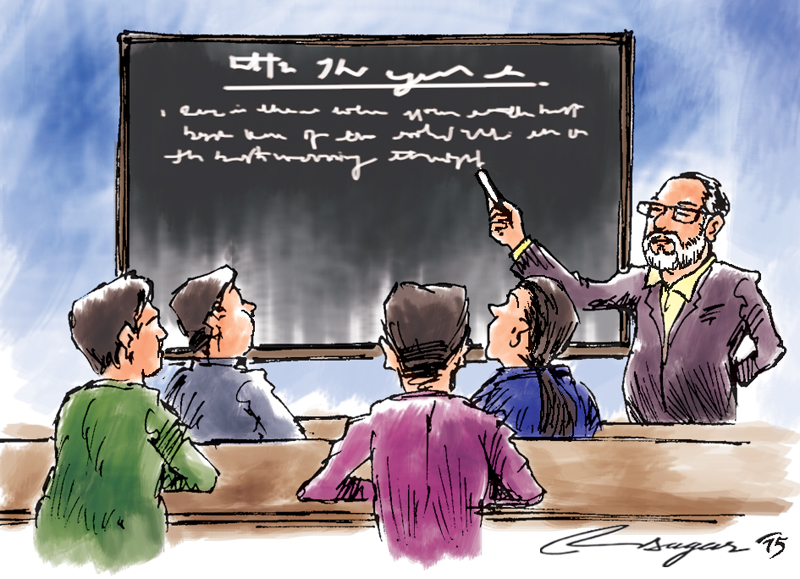Integrity education: Setting the scene
According to a recent report of Commission for the Investigation of the Abuse of Authority education is the most corrupt sector in Nepal and most of the cases filed are from this. Many teachers have been resigning as they possess fake certificates, and professors and other responsible professionals of different universities have been arrested by the Commission. It depicts a miserable picture of integrity in education. Integrity in education is a very sensitive issue because it is concerned with that field which is dedicated to design the destiny of the nation by enhancing the overall development of the students. Students who are the future pillars of the nation determine how the nation will be in the future. Hence, the sort of culture we inculcate in them, the way they get involved in personality development activities, their dedication and commitment, their honesty, their far sighted vision with ample resistance to tempting factors determine their academic outcomes and the future of the nation.
Recent cases of question paper leaks prior to the exams are condemnable acts of selling morality, ethics and integrity. It deserves criticism in the bitterest of terms. People involved in teaching are expected to possess high moral values and sense of service. Such corrupt practices have defamed and stigmatized the pious profession of teaching. It is jeopardizing the whole education sector, because it ultimately encourages the students to adopt unhealthy shortcuts for success instead of hard labor, dedication, and perseverance. What sort of educational culture are we inculcating in our students, the future of the nation?
Anti-corruption campaigns should reach every nook and corner of the country and the corrupt ones should be legally punished and socially discarded. Moral education should be incorporated in the mainstream of our education system at all the levels
The legacy of long prevailing corrupt practices, the corrupt mechanism either paralyzing the fair ones or demolishing their integrity, indebtedness of educational leaders towards the political lords for their favor, lack of awareness and willpower in other stakeholders to resist it and low functioning anti-corruption bodies in education along with the material lust in the people in responsible posts are the major causes of this social disease. How can the highly respected university professors who are supposed to be the guiding light for all show low levels of ethical and moral values?
Similarly, there can be unfairness in grading because of different reasons. Monetary temptation, cultural bias, hasty generalization, hidden petty interests etc. may lead towards unfair judgment and grading and this ultimately deteriorates the educational quality. Teachers or faculties should be able to display fairness in grading the students so that right people can get the right place in the future, and it doesn’t dishearten and discourage the competent students. On the other hand, sincere interaction between the faculty and the students opens avenues of hope for the holistic development of students.
Honest delivery in the classroom, creation of conducive and amicable teaching learning environment in and outside the class, honest addressing of the students’ needs and concerns, genuine attempts to nurture the interests and sharpen the instincts of students and the sincere and well felt endeavor to bring out inherent talents and hidden potentialities of the students can help lift the curtains of possibilities of their multidimensional development. Realistic interaction between the teachers and the students facilitates the identification of impediments and hurdles for students’ learning and to adopt ways to accelerate learning. However, in this matter also the issue of integrity is crucial as it determines the outcomes of efforts and reveals the need of integrity education
Dilly-dallying and procrastination that have been important features of our culture are the other forms of corruption. Nepali time is our own time, with ‘delay’ as its identity. Corruption and sluggishness define our national mechanism. Exhausting and tedious procedures, you need to bow before a long chain of personnel, expecting ‘under-table fees ‘, to get the work done. Otherwise, you will be the victim of deliberately developed complications and entanglements! Every sector is more or less infected.
Above all the deliberate simplification and complication of any official work depends on what one receives for the task. When teachers cannot internalize the piety of their profession and don’t understand that they are the moral guides of the society, it degrades and devaluates their values. In our culture teachers are believed to be those who eliminate darkness and enlighten the lives of students thereby enlightening the whole humanity. However, our academic sector is infected by the social disease of corruption, and it has stigmatized the image of teachers. It can be only be eliminated through integrity education.
Anti-corruption campaigns should reach every nook and corner of the country and the corrupt ones should be legally punished and socially discarded. But the pomp and show and the motive of merely hitting the headlines has been doing nothing for the elimination of this social evil. Moral and integrity education should be incorporated in the mainstream of our education system at all the levels to produce the manpower with high morality and integrity. Let all our efforts be result oriented. May integrity be the fragrance of our life!
Gautam is Visiting Faculty, Kathmandu University School of Education






